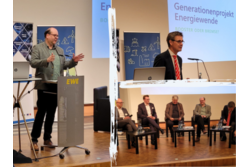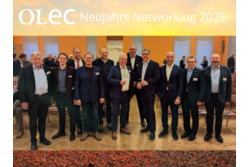
"Generational energy transition project - booster or brake?" - was the title of an event on 10 June in Oldenburg, which dealt intensively with the consequences of the energy transition for the economy in the north-west. Organised by the Oldenburg Chamber of Industry and Commerce (IHK) and the Oldenburg Energy Cluster OLEC, the event with over 50 participants enabled an exchange between politics, business and science.
Lower Saxony's Minister for the Environment, Energy and Climate Protection, Christian Meyer, opened the event with a speech. He emphasised the enormous opportunities that the energy transition offers for the north-west of Lower Saxony and addressed the challenges. He emphasised the need to achieve the ambitious expansion targets and relieve the burden on companies in the process. "We are on the right track," said the Energy Minister, "because last year we covered our entire electricity requirements from renewable energies for the first time in Lower Saxony." But: "We must not let up and must keep up the pace, especially with regard to licences and recruiting skilled workers," said Meyer. Electricity prices must continue to fall. Meyer announced a Federal Council initiative with the aim of reducing electricity taxes to the European minimum. Other levies on electricity should also be reduced in the long term.
Jan Müller, President of the Chamber of Industry and Commerce, provided an insight into the status of the energy transition in Lower Saxony and highlighted the concerns and expectations of the regional economy. Companies are particularly concerned about energy prices. "Competitive energy prices are necessary for the economy," Müller explained. "This is all the more important as the future demand for electricity will increase significantly as a result of the energy transition. An important question is how we can achieve competitive energy prices today and not only once we have reached our expansion targets for renewable energies," said Müller.
The discussions and contributions at the event provided important impetus for the further shaping of the energy transition in the region. The participants agreed that close cooperation between politics, business and science is crucial to mastering the challenges and making the most of the opportunities presented by the energy transition.
Innovative approaches to reducing energy costs and increasing security of supply were particularly emphasised. Concrete solutions were presented on how companies can be relieved and bureaucratic requirements can be reduced.
For example, incentives could be created for the establishment of wind and solar parks if customers in the neighbourhood have to pay reduced grid fees or if electricity generation, storage and consumption are coordinated in commercial areas through demand-oriented concepts and energy sharing, thus relieving the strain on the grids, it was said.
"An electricity grid with more renewable energies requires more flexible consumption structures and storage. In the current discussion about adjusting electricity grid fees to incentivise this potential, the real possibilities of industry must always be taken into account. Many industrial processes have to run continuously, while others can organise their electricity consumption more flexibly. The new regulations must not lead to an additional burden on companies and the provision of flexibility should be incentivised through additional remuneration models," says Tim Eshold, Head of Energy and Politics at Glencore Nordenham.
Text: Oldenburgische IHK
Pictures: OLEC e.V.
Translated with www.DeepL.com/Translator (free version)












